Posts filed under ‘Education’
Philanthropy Ohio opposes eliminating Ohio’s Learning Standards
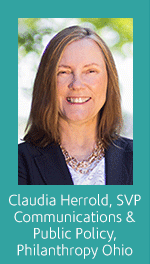 With the Ohio House Education and Career Readiness Committee hearing tomorrow to address school assessments, curricula and teacher evaluations, we wrote Chairman Brenner, Vice-Chairman Slaby and Ranking Minority Member Fedor to express our opposition to House Bill 176 and 181.
With the Ohio House Education and Career Readiness Committee hearing tomorrow to address school assessments, curricula and teacher evaluations, we wrote Chairman Brenner, Vice-Chairman Slaby and Ranking Minority Member Fedor to express our opposition to House Bill 176 and 181.
Philanthropy Ohio and its Education Initiative specifically oppose the elimination of Ohio’s newly-revised Learning Standards.
The hearing is Tuesday, Oct. 24, at the Ohio Statehouse at 4 p.m.
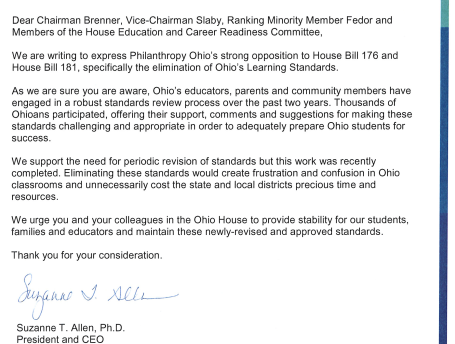
See the full letter letter below.
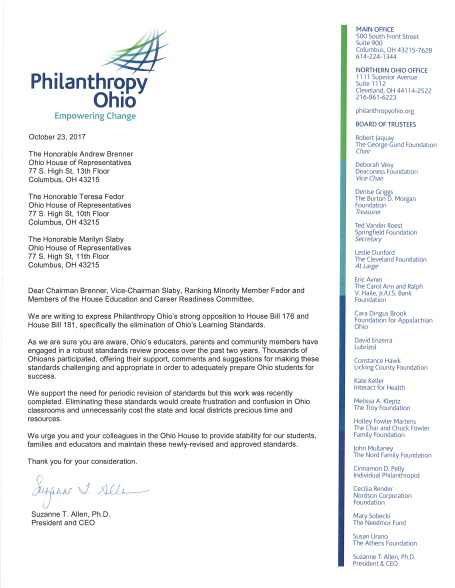
Claudia Y.W. Herrold
October 23, 2017 at 5:37 pm Philanthropy Ohio Leave a comment
Make college affordable for Ohioans
 Philanthropy Ohio released its latest education recommendations to Governor John Kasich, the Ohio General Assembly, the Ohio Department of Higher Education and other education policy leaders on February 9, at a briefing held at the Statehouse Atrium. Building on the recent release of Philanthropy Ohio’s K-12 education briefing papers, the report, Investing in Ohio’s Future. Now. A Postsecondary Education Access and Affordability Agenda for Ohio, analyzes Ohio’s progress in making college more affordable for Ohio’s students and families and offers recommendations on how to improve affordability. The report’s ultimate vision is to ensure that more Ohioans attain a post-secondary credential of value so they are prepared to participate and succeed in Ohio’s workforce.
Philanthropy Ohio released its latest education recommendations to Governor John Kasich, the Ohio General Assembly, the Ohio Department of Higher Education and other education policy leaders on February 9, at a briefing held at the Statehouse Atrium. Building on the recent release of Philanthropy Ohio’s K-12 education briefing papers, the report, Investing in Ohio’s Future. Now. A Postsecondary Education Access and Affordability Agenda for Ohio, analyzes Ohio’s progress in making college more affordable for Ohio’s students and families and offers recommendations on how to improve affordability. The report’s ultimate vision is to ensure that more Ohioans attain a post-secondary credential of value so they are prepared to participate and succeed in Ohio’s workforce.
TY @PhilanthropyOH for hosting a conversation on #college affordability! We need to do better #Ohio if we want to stay economically viable. pic.twitter.com/0s2YmtwYy2
— Rachel Goodspeed (@rachelgoodspeed) February 9, 2017

Philanthropy Ohio President & CEO Suzanne T. Allen, speaks at the College Affordability in Ohio event.
Investing in Ohio’s Future. Now. A Postsecondary Education Access and Affordability Agenda for Ohio is anchored to Ohio’s Attainment Goal 2025: 65 percent of Ohioans, ages 25-64, will have a degree, certificate or other postsecondary workforce credential of value in the workplace by 2025. Currently, Ohio is 36th out of 50 states for overall educational attainment, with approximately 43.2 percent of working age Ohioans holding a post-secondary degree or certificate. Ohio’s investment in higher education, generally, and need-based aid specifically, is not keeping pace with our peer states.
Did you know? By 2020, 64% of Ohio jobs will require postsecondary education credentials. #Columbus @PhilanthropyOH @SuzanneAllen pic.twitter.com/TgbFKT18YX
— The Ohio Standard (@TheOHStandard) February 9, 2017
If Ohio wants to continue to grow its economy, we must make college more affordable for all Ohioans or we will continue to face workforce challenges that will threaten our economic future. This report and its recommendations outline the challenges and offer solutions on what we believe needs to happen so Ohio gains ground: being 45th in affordability is not acceptable, particularly given that two-thirds of all jobs in Ohio require post-secondary education.
Suzanne T. Allen, PhD, of @PhilanthropyOH kicks off the #College Affordability in #Ohio briefing. #education @HECGCLEVELAND pic.twitter.com/HPWIuRtI4X
— SEI (@SummitEdInit) February 9, 2017
 The release of these recommendations coincides with the release of Governor Kasich’s final biennial budget that includes proposals aimed at improving higher education in Ohio. Some of our recommendations mirror or complement those proposed by the governor and his administration and we are heartened by that, and we will continue to push the Ohio General Assembly to build on these proposals to make them even more impactful, sooner.
The release of these recommendations coincides with the release of Governor Kasich’s final biennial budget that includes proposals aimed at improving higher education in Ohio. Some of our recommendations mirror or complement those proposed by the governor and his administration and we are heartened by that, and we will continue to push the Ohio General Assembly to build on these proposals to make them even more impactful, sooner.
To learn more about our education policy work and recommendations, visit https://www.philanthropyohio.org/education.
Claudia Y.W. Herrold
February 27, 2017 at 11:41 am Philanthropy Ohio Leave a comment
Helping every Ohio student succeed
 Ohioans have a unique opportunity this fall to weigh in on what the state needs to do to make sure that all students succeed in school, during 10 regional meetings we are co-hosting with the Ohio Department of Education (ODE). The regional meetings are one of the ways that ODE is meeting a new requirement of engaging stakeholders to create a state education plan, part of the new Every Student Succeeds Act (ESSA) that was passed by Congress in late 2015. It is the first major overhaul of federal education policy in years and shifts the broad federal oversight of primary and secondary education to greater, more flexible decision making at the state and local levels.
Ohioans have a unique opportunity this fall to weigh in on what the state needs to do to make sure that all students succeed in school, during 10 regional meetings we are co-hosting with the Ohio Department of Education (ODE). The regional meetings are one of the ways that ODE is meeting a new requirement of engaging stakeholders to create a state education plan, part of the new Every Student Succeeds Act (ESSA) that was passed by Congress in late 2015. It is the first major overhaul of federal education policy in years and shifts the broad federal oversight of primary and secondary education to greater, more flexible decision making at the state and local levels.

The Dayton ESSA Ohio Stakeholder meeting took place at the Strivers School for the Arts.
A couple of weeks ago I attended the Dayton regional meeting, where nearly 175 people gathered at the Stivers School for the Arts for an evening discussing ESSA. Local educators, parents, community members and funders began the evening with an overview of the law before heading to the cafeteria for snacks and table conversations that lasted more than an hour and a half. Joining in the talks were members of the State Board of Education – Tom Gunlock, A.J. Wagner, Ron Rudduck and Tess Elshoff – as well as Senator Peggy Lehner, Representatives Niraj Antani, Jeff Rezabek and Jim Butler and former Governor Bob Taft.

State Superintendent of Public Instruction Paolo DeMaria speaks with Jenni Roer, executive director of the Frank M. Tait Foundation.
The state’s new Superintendent of Public Instruction, Paolo DeMaria, spoke for a few minutes at the beginning of the night, welcoming participants and encouraging them to “Speak your mind because I’m looking for the unvarnished truth.” Superintendent DeMaria spent the next couple of hours walking through the cafeteria, listening to table conversations.
The conversations gathered thoughts – with copious notes taken at each table and handed in at the end of the evening for compilation – on a number of topics: standards & assessments, accountability, educator effectiveness and school improvement & student supports. As you can imagine, people had many different perspectives and opinions on the topics.

Nearly 175 parents, educators, policymakers and community members attended the Dayton ESSA meeting.
We’ll be reading through all of the notes from the 10 meetings, identifying common themes as well as specific, regional issues, which we’ll present in a white paper later this fall. ODE is set to release a draft of its state plan in November, with a final plan due to the federal government sometime next year. We hope that our paper, along with several other briefs we have just released will help inform the state’s plan and help ensure that every Ohio student succeeds.
Claudia Y.W. Herrold
September 19, 2016 at 5:01 pm Philanthropy Ohio Leave a comment
The Fight to Keep Ohio’s New Learning Standards
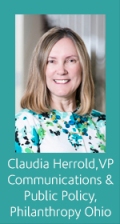 It’s been a busy few weeks for the 42-member Ohio Standard Coalition, on which Philanthropy Ohio and many of our members serve.
It’s been a busy few weeks for the 42-member Ohio Standard Coalition, on which Philanthropy Ohio and many of our members serve.
The Coalition has been hard at work clarifying myths and showing support for Ohio’s New Learning Standards, within the Common Core State Standards – in light of proposed H.B. 597.
We had nearly 130 speakers and written testimony submitted showing support for Ohio’s New Learning Standards at the H.B. 597 hearings. Click here to view the testimony.
 Beyond the Coalition, community leaders have also backed our position, and last Thursday, the Ohio Standard Coalition held a press conference at the Statehouse where Ohio business leaders expressed their strong support for the standards and opposition to H.B. 597. In addition, a representative from the State University Education Deans spoke about the deans’ opposition to the bill. Check out the website for ongoing coverage and updates.
Beyond the Coalition, community leaders have also backed our position, and last Thursday, the Ohio Standard Coalition held a press conference at the Statehouse where Ohio business leaders expressed their strong support for the standards and opposition to H.B. 597. In addition, a representative from the State University Education Deans spoke about the deans’ opposition to the bill. Check out the website for ongoing coverage and updates.
The next committee hearing has been scheduled for Thursday, September 4, at 10 a.m. at the Ohio Statehouse Room 313. At this hearing we expect amendments to the bill and a possible vote.
Follow and join in the conversation on Twitter via @TheOhioStandard and #OHstandards.
Over the last few weeks, there has been amazing outreach, support and engagement from individuals and organizations. This has been a great team effort – exactly why this Coalition was created. I hope we can keep up this level engagement over the next few months because we are not done when the hearings end.
Your dedication to our children is inspiring!
Claudia Y.W. Herrold
September 2, 2014 at 11:26 am Philanthropy Ohio Leave a comment
OGF Commits to Working on School Funding
In recognition of OGF’s continuing role as an honest and neutral broker, a bi-partisan group of members from the Ohio General Assembly and other education stakeholders has approached OGF to support the on-going research and development of a K-12 school funding formula. Through the generosity of OGF members, we have engaged school funding experts to help our state’s leaders think through critical elements of school funding. The first product of this work was delivered in late spring when Paolo DeMaria, Education First Consulting, testified before the Ohio House and presented a series of research and data on the history of school funding in Ohio. The PowerPoints, including a narrative explanation, are available on OGF’s website and will be made available publicly by Ohio Government TV in the next few weeks.
In addition to this research, OGF is working with legislative leaders to identify school funding experts from across the country to meet with education stakeholders. The goal is to ensure our leaders have the greatest possible knowledge-base on these critical and very complicated issues. A final piece of this work is a series of regional meetings that OGF will co-sponsor with the legislature to ensure Ohioans have a voice in these decisions. The meetings will include a time for community dialogue followed by a formal legislative hearing on the issues. As of this posting, times and locations have not been finalized.
Coming out later this fall is an update to OGF’s original education report, Education for Ohio’s Future, published in December 2006. OGF will present the update at its annual conference in November and will feature a progress report on important education milestones and data points over the last five years as well as a series of recommendations on how to continue to improve Ohio’s education system so our students graduate with the skills and knowledge to compete in an ever-changing economy. OGF’s Education Advisory Committee continues to direct this important work and we hope you will join the team as this work progresses.
Lisa Gray
Education Initiative Project Director
August 6, 2012 at 11:30 am Philanthropy Ohio Leave a comment
From innovation to inventiveness
OGF welcomes guest blogger John Mullaney, executive director of The Nord Family Foundation.

Innovation is not simply invention; it is inventiveness put to use. Invention without innovation is a pastime.
– Harold Evans – former editor of the London Sunday Times
Innovation has become quite the bantered word in philanthropy. The Stanford Social Innovation Review has featured several articles on social innovation. Grantmakers for Effective Organizations has dedicated a series of conferences to the challenge of scaling what works.
In too many cases, foundations fund creative programs initiated by nonprofit organizations which prove effective by many measures, but for reasons unknown to many, fail to be replicated in other communities. These are cases where inventiveness is not put to use. Knowing these efforts are more than mere pastimes, many in the philanthropic and nonprofit communities are beginning to ponder these issues.
The Innovator’s Way – Essential Practices for Successful Innovation by Peter J. Denning and Robert Dunham is prominent in the business section at most book stores. Geared primarily to the business sector, the book is completely relevant to the nonprofit and foundation sector as well. The writers insist that an innovator can determine success when three factors converge:
Domain expertise – is your skill in the community of practice you aim to change.
Social interaction practices – is your skill at influencing others and mobilizing action around your ideas.
Opportunities – acknowledging that you cannot control your environment, but you can control how you engage with it. Successful innovators have a high sensitivity to people’s concerns and breakdowns, an ability that might be called “reading the world.”
I would argue that most foundations have – by their nature – all three elements for successful innovation. Their interaction with grantees sheds light on domain experience; successful staff members sense opportunities to read the world and convey that to trustees; and finally, the ability to convene people from sectors outside the ambit of the nonprofit world provides singular social interaction practices that can indeed bring “inventions” in the nonprofit world to scale.
The Nord Family Foundation has made several grants to support technological inventions that demonstrate improvements in the ways children and adults learn, as in the case of past support of CAST – The Center for Applied Special Technologies. Early support for this pilot program in Lorain County schools resulted in two highly successful products, the Thinking Reader™ and Science Writer™, which are software tools that embrace CAST’s highly successful Universal Design for Learning (UDL) pedagogy.
The foundation’s support to the Bellefaire Monarch School enabled computer programmers at Monarch’s commercial site (Monarch Technologies) to pilot and refine the interactive software program Vizzle™ that is now being offered for an IPO. In March, Vizzle’s inventor wrote to us to let us know that Vizzle was now being implemented in twenty-eight schools across the Los Angeles Unified School District to help children with autism. Research shows that children with autism pay more attention and retain more of what they learn when lessons are presented interactively utilizing technology. Similarly, The Manila Times announced a significant Vizzle pilot program backed by the Philippines’ Department of Education. This news was reported in at least four Filipino daily papers. Just last month, Vizzle was featured in Crain’s Cleveland Business.
Recognizing the potential Vizzle had to enhance the ability of special education teachers in public schools to improve their ability to work with the increasing number of autistic children in schools, the Nord Family Foundation trustees approved a grant to the Joshua School in Denver. Joshua School focuses entirely on autistic children and, like the Monarch School in Cleveland, is a personalized but very expensive program. Families without the ability to pay the $20,000 tuition ($60,000 at Monarch) are left to fend on their own. Joshua School, in collaboration with Monarch, provides the program and training for public school teachers. In Denver, public school special education teachers from around the state come to Joshua to learn Vizzle.
This is just one example of how the foundation took an invention in Cleveland and helped bring it to scale nationwide and seed it internationally. That is the essence of inventiveness – a legacy for which this family is both familiar and proud.


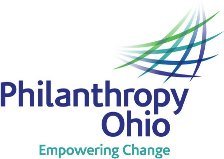
Common Core State Standards
This week’s blog shares a recent letter Philanthropy Ohio sent to members of the Ohio General Assembly.
Dear General Assembly member,
Philanthropy Ohio, a respected statewide association of over 200 foundations, corporate giving programs and other individuals and grantmaking organizations who give millions of dollars each year to support improved education, continues to play a leadership role in the critical issues affecting education in Ohio. Our goal is substantial improvement in the education and lives of children and adults across our state. For this very reason, we strongly support Ohio’s adoption of New Learning Standards, including the Common Core State Standards.
As we noted in our recent education report, Preparing Students for Success in Life, the new standards are:
Philanthropy Ohio and its members have been strong supporters of Ohio’s new learning standards, accompanying assessments and the new A-F school report cards. In making this transition to the new standards and assessments, we know there will be confusion and concern about these new more challenging expectations and assessments, but we urge you as policymakers, to continue to support the on-going work that is taking place in classrooms, schools and districts to ensure our students are prepared for success in whatever they choose to pursue after high school.
If you have any questions or need additional information, please do not hesitate to contact me.
Sincerely,
Suzanne T. Allen, Ph.D.
President
Share this:
September 30, 2013 at 9:00 am Philanthropy Ohio Leave a comment